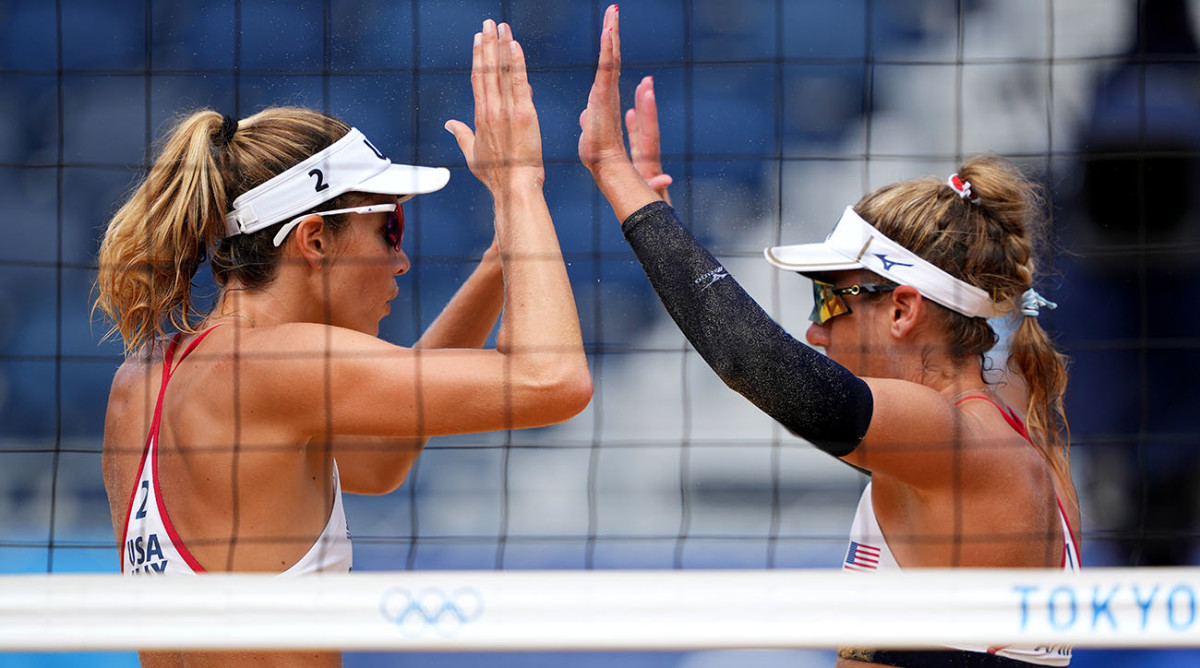Team USA Beach Volleyball Pair Alix Klineman and April Ross Hours Away From Gold Medal Opportunity

TOKYO — The gamblers looked at one another. When had they known their bet would pay off?
“When we won our first tournament,” said Alix Klineman.
“It’s funny, because I was committed,” said April Ross. “This was gonna be my partner for the quad, and however we started, that was just going to be how we started, we're gonna work through it. But we did win our first international tournament, and it was just kind of like, Well, duh.”
Klineman laughed. “We made the right choice,” she said.
Twenty-four hours from a chance at an Olympic gold medal in beach volleyball, it sure seems that way.
They beat Switzerland in the semifinal in straight sets, 21–12, 21–11, playing an aggressive style they had settled on beforehand to counter the physical Swiss players. Klineman had four points on blocks. Both sets were close early before the Americans dispatched the Swiss.
“They put a lot of service pressure on,” said Anouk Vergé-Dupré. “We didn’t know how to respond. As soon as they had a few points of an advantage, the game was easier for them.”
That has been true for the whole tournament. They have lost just one set since they got to Tokyo.
Americans are so used to dominating at women’s beach volleyball that this outcome might seem unremarkable. Misty May-Treanor and Kerri Walsh Jennings won gold in straight sets in 2004, ’08 and ’12. But Ross and Klineman did not have the benefit of a decade working together, refining their pairing, finishing one another’s sentences.
Five years ago, Ross had a different partner and Klineman had a different job. Ross, now 39, had taken silver in London with Jennifer Kessy, then paired with Walsh Jennings after May-Treanor retired. They captured bronze in Rio.
Meanwhile, Klineman, now 31, was playing indoor volleyball. She had played in high school, at Stanford and as a professional in Italy and Brazil. She competed five times for the national team. But when it came time to select the team for Rio, she did not make the roster. She decided to switch to beach volleyball, where the team is selected by results rather than coach’s decision.
Ross already liked Klineman’s physicality and blocking ability, and she noted her work ethic and intensity. But it was the reasoning behind that choice that really caught Ross’s attention.
“I knew her story,” she said. “I knew that you know she was coming out to the beach to make the Olympics. To take such a risk for herself, I knew that was going to be a huge motivating factor.”

Ross was taking a risk for herself, too. Automatic entries in tournaments are decided by the International Volleyball Federation’s point system. Klineman had zero points. That meant there would be a lot of qualifiers in their future.
But they connected immediately. The veteran helped the rookie adapt her game; the rookie helped rejuvenate the veteran. “Alex does study the game more than anyone else I’ve ever known,” Ross said, laughing. “She’d watch a ton of videos and I'd be like, ‘Well, I'm gonna go home and watch video, too!’”
They played Thursday’s match at 9 a.m. in heat that iPhones said “feels like” 99 degrees. (That seemed like an understatement.) The gold-medal match is scheduled for Friday at 11:30 a.m., against Australia’s Mariafe Artacho del Solar and Taliqua Clancy. The heat has been oppressive enough that the International Olympic Committee moved tennis matches from midday to afternoon last week, and the Canadian women’s soccer team has asked to move its gold-medal game against Sweden from 11 a.m. to either earlier or later.
Ross and Klineman said they would not be making a similar request. Three weeks before they left for Tokyo, they spent a week in Orlando, training for the weather.
“It crushed me the first few days,” Klineman said. But she said they had grown used to it. “We’re prepared for whatever they tell us,” she said.
They are guaranteed at least silver, which means Klineman will take home her first Olympic medal. Ross becomes the oldest woman to win a beach volleyball medal, and the first one to win three with three different partners. But they say they are here for one another.
“Ever since becoming her partner, there's been a big feeling of not wanting to let her down, because she took a huge risk on me,” said Klineman.
“I feel the same way!” said Ross. “She’s worked so hard to get where she is. I didn’t want to let her down.” They both smiled. They might not be finishing one another's sentences just yet. But they make a good pair.
More Olympics Coverage:
• How Simone Biles Came Back to Win the Bronze of Her Life
• Noah Lyles's Bronze Medal Win a Poignant Moment in His Olympic Journey
• The Stories—and Science—Behind Track and Field's Electric Finish-Line Dives
• Teens Sweep the Medals, Show Unique Culture of Park Skateboarding at Olympic
